イベント&アクティビティ
Franz Waldenberger gives talk at Japan-Germany Forum
-480x223.png)
Upon invitation by the Asia-Eurasia Research Institute DIJ director Franz Waldenberger will give a talk in Japanese on “Japan’s past and present through the eyes of a German” at the Japan-Germany Forum on June 15. The talk will take place online (Zoom) from 14.00-15.00h JST. It will be moderated by Hayase Isamu, chairman of the Japan-Germany Forum. Registration and details here
The Future of Liberalism: international symposium with keynote by Thomas Piketty
 Thomas Piketty, French economist and author of Capital in the Twenty-first Century, will be the keynote speaker at the symposium ‘The Future of Liberalism: Japan, France and Germany in global context’. It will take place online from June 7 to 9 and features 18 international experts on liberalism and capitalism. On Day 1, Piketty’s keynote will be followed by a roundtable discussion with Lisa Herzog (University of Groningen) and Shigeki Uno (University of Tokyo). Day 2 features nine presentations, including by DIJ alumna Yufei Zhou on the “Transition of the Dominant Economic Ideology in China in the 21st Century”. On the closing day, DIJ director Franz Waldenberger will present his paper “Governance in a Knowledge Driven Society”. The symposium is jointly organised by the DIJ, the French Institute of Research on Japan at the Maison franco-japonaise (MFJ), and the Nippon Institute of Research Advancement (NIRA). Registration and details here
Thomas Piketty, French economist and author of Capital in the Twenty-first Century, will be the keynote speaker at the symposium ‘The Future of Liberalism: Japan, France and Germany in global context’. It will take place online from June 7 to 9 and features 18 international experts on liberalism and capitalism. On Day 1, Piketty’s keynote will be followed by a roundtable discussion with Lisa Herzog (University of Groningen) and Shigeki Uno (University of Tokyo). Day 2 features nine presentations, including by DIJ alumna Yufei Zhou on the “Transition of the Dominant Economic Ideology in China in the 21st Century”. On the closing day, DIJ director Franz Waldenberger will present his paper “Governance in a Knowledge Driven Society”. The symposium is jointly organised by the DIJ, the French Institute of Research on Japan at the Maison franco-japonaise (MFJ), and the Nippon Institute of Research Advancement (NIRA). Registration and details here
New special issue of Contemporary Japan on employment and HR
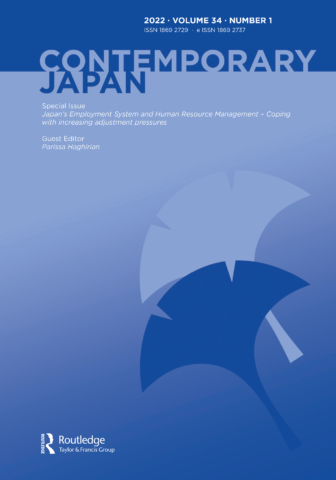
The newest edition of Contemporary Japan (vol. 34, no. 1) is a special issue on “Japan’s Employment System and Human Resource Management – Coping with increasing adjustment pressures”, guest edited by Parissa Haghirian. In addition to Haghirian’s introductory overview of the various changes and challenges in Japan’s contemporary employment system, the four research articles by Robinson/Sibala/Ito/Beyer, Meyer-Ohle, Debroux, and Koyama address the legal, social, economic, and business implications of non-regular forms of employment. In addition, they discuss some of the ways that firms are dealing with the increasing presence of women, senior workers, and foreigners in the workforce. The book review section includes a broad range of recent publications in the fields of international relations, history, anthropology, media studies, literature, and religious studies. Please see the full issue here
“Digital currencies should be introduced as early as possible”: Markus Heckel interviews Hiromi Yamaoka
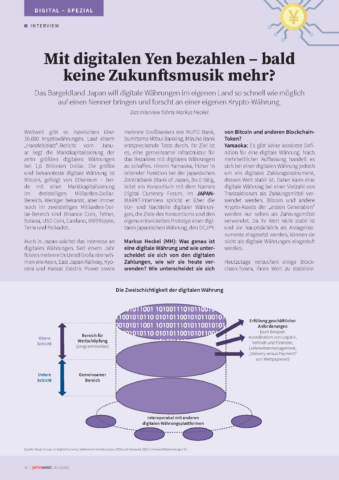
DIJ economist Markus Heckel has interviewed Hiromi Yamaoka about the development of cryptocurrencies in Japan. Yamaoka, who worked for the Bank of Japan and the International Monetary Fund, is now chairperson of the Digital Currency Forum (DCF) and Head of the Future Institute of Research. In the interview, Yamaoka explains the advantages and disadvantages of digital currencies, the goals of the DCF, and the prototype of a privately created digital Japanese currency (DCJPY). “To maximise the benefits of the digitalisation of the economy, I believe it would be better to introduce private sector digital currencies as early as possible”, Yamaoka said. Yamaoka has also contributed a chapter to the open access book The Future of Financial Systems in the Digital Age: Perspectives from Europe and Japan, edited by Markus and DIJ director Franz Waldenberger. The interview (in German) was published in the latest issue of Japanmarkt and is available for download here
Book chapter by David M. Malitz examines Meiji Japan as role model for Thai revolution
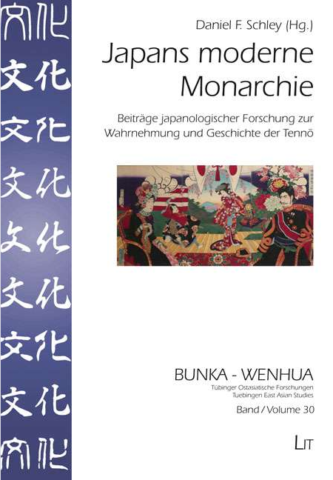
The perception of Imperial Japan is usually shaped by its last decades of invasion, aggression, and war. However, Meiji Japan also served as a model for other Asian countries and peoples in their pursuit of democracy, independence, and modernity. A new book chapter by DIJ senior research fellow David M. Malitz, published in Japans moderne Monarchie. Beiträge japanologischer Forschung zur Wahrnehmung und Geschichte der Tenno (in German; LIT Verlag, Bunka-Wenhua. Tuebingen East Asian Studies), investigates how Meiji Japan and the Meiji Emperor inspired the constitutional reform movement across semi-colonial Asia. Focusing on Thailand prior to the revolution of 1932, David’s chapter “Kaiser Meiji als Vorbild für die Monarchien des halbkolonialisierten Asiens im Vorfeld deren konstitutionellen Revolutionen im frühen 20. Jahrhundert” shows how ignorance of Imperial Japan’s political regime allowed the projection of one’s own political ideas onto the Meiji Emperor and enabled veiled yet harsh criticism of one’s own monarch.
Spring issue of DIJ Newsletter published
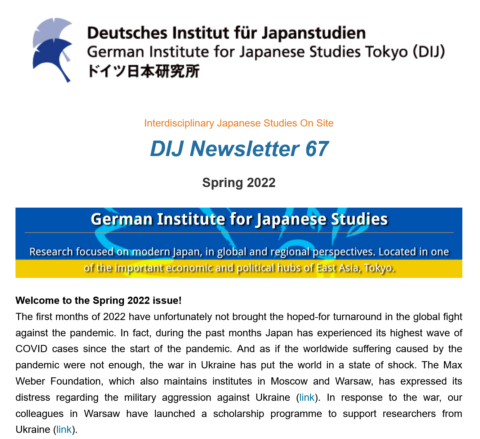
We have just published the spring issue of our DIJ Newsletter featuring updates on our research, publications, and events, including books on the future of the financial system; a new special issue of Contemporary Japan; announcing a symposium on the future of liberalism in June; a new article in our Catchword series (Kodomo Kateichō); farewell to three staff members; Alumni news; job advertisements; new videos on our DIJ YouTube channel and much more. We hope you will enjoy exploring this new edition of the DIJ Newsletter. If you haven’t done so yet, you can subscribe to receive it directly to your inbox. The full issues and subscription form are available here.
New book publications analyse digital transformation of financial system
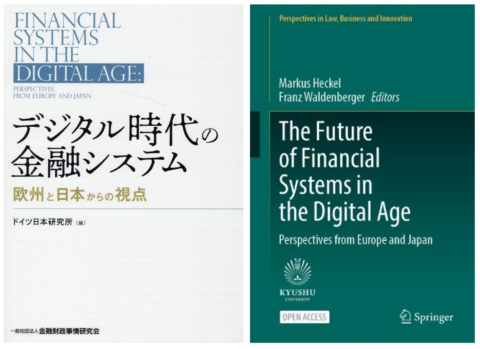
The increasing capacity of digital networks and computing power, together with the resulting connectivity and availability of “big data”, are impacting financial systems worldwide. They transform the structure and performance of financial markets and the business models of banks and other financial service providers. The new open access book The Future of Financial Systems in the Digital Age: Perspectives from Europe and Japan, edited by DIJ director Franz Waldenberger and principal researcher Markus Heckel, brings together leading scholars, policymakers, and regulators from Japan and Europe to analyse the digital transformation of the financial system. The authors study the impact of digitalization on the financial system, including transaction costs, digital and blockchain-based currency systems, algorithmic trading, the use of cashless payments, the challenges of regulatory oversight, and the transformation of banking business models. The book and its individual chapters can be downloaded for free here. A Japanese version of the book has been published as デジタル時代の金融システム―欧州と日本からの視点 by the Kinzai Institute for Financial Affairs.
Article co-authored by Markus Heckel investigates the complexity of monetary policy
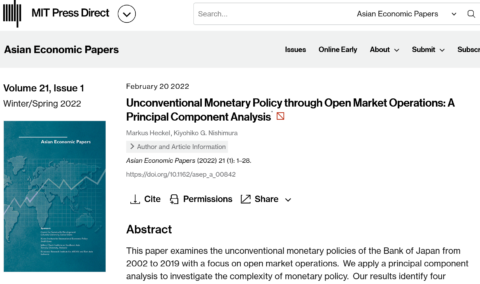
A new article co-authored by DIJ economist Markus Heckel and Kiyohiko G. Nishimura (GRIPS) examines the unconventional monetary policies of the Bank of Japan from 2002 to 2019 with a focus on open market operations. “Unconventional Monetary Policy through Open Market Operations: A Principal Component Analysis” (Asian Economic Papers, 21 (1), pp. 1–28) identifies four principal components that explain the variance of measures taken by the Bank of Japan and its operations of various facilities: asset purchase measures including Japanese Government Bonds (JGBs), Exchange-Traded Funds (ETFs), Japanese Real Estate Investment Trusts (J-REITs), and three different liquidity supply measures. Complexity differs substantially among different governorships of Fukui, Shirakawa (most complex), and Kuroda. The article is an outcome of Markus’ research project Economic Discourses of Monetary Policy – The Case of the Bank of Japan.








 Open Access
Open Access
